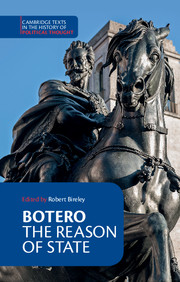
-
Select format
-
- Publisher:
- Cambridge University Press
- Publication date:
- November 2017
- September 2017
- ISBN:
- 9781316493953
- 9781107141827
- 9781316506721
- Dimensions:
- (216 x 138 mm)
- Weight & Pages:
- 0.43kg, 270 Pages
- Dimensions:
- (216 x 138 mm)
- Weight & Pages:
- 0.33kg, 270 Pages
You may already have access via personal or institutional login
Book description
Niccolò Machiavelli's seminal work, The Prince, argued that a ruler could not govern morally and be successful. Giovanni Botero disputed this argument and proposed a system for the maintenance and expansion of a state that remained moral in character. Founding an anti-Machiavellian tradition that aimed to refute Machiavelli in practice, Botero is an important figure in early modern political thought, though he remains relatively unknown. His most notable work, Della ragion di Stato, first popularised the term 'reason of state' and made a significant contribution to a major political debate of the time - the perennial issue of the relationship between politics and morality - and the book became a political 'bestseller' in the late sixteenth and the seventeenth century. This translation of the 1589 volume introduces Botero to a wider Anglophone readership and extends this influential text to a modern audience of students and scholars of political thought.
Contents
Metrics
Altmetric attention score
Full text views
Full text views help Loading metrics...
Loading metrics...
* Views captured on Cambridge Core between #date#. This data will be updated every 24 hours.
Usage data cannot currently be displayed.
Accessibility standard: Unknown
Why this information is here
This section outlines the accessibility features of this content - including support for screen readers, full keyboard navigation and high-contrast display options. This may not be relevant for you.
Accessibility Information
Accessibility compliance for the PDF of this book is currently unknown and may be updated in the future.


